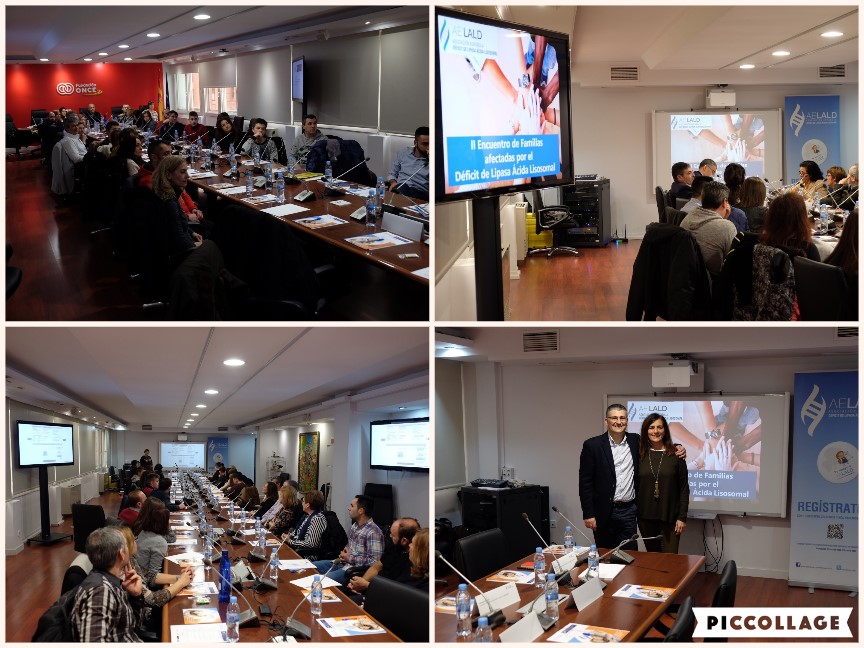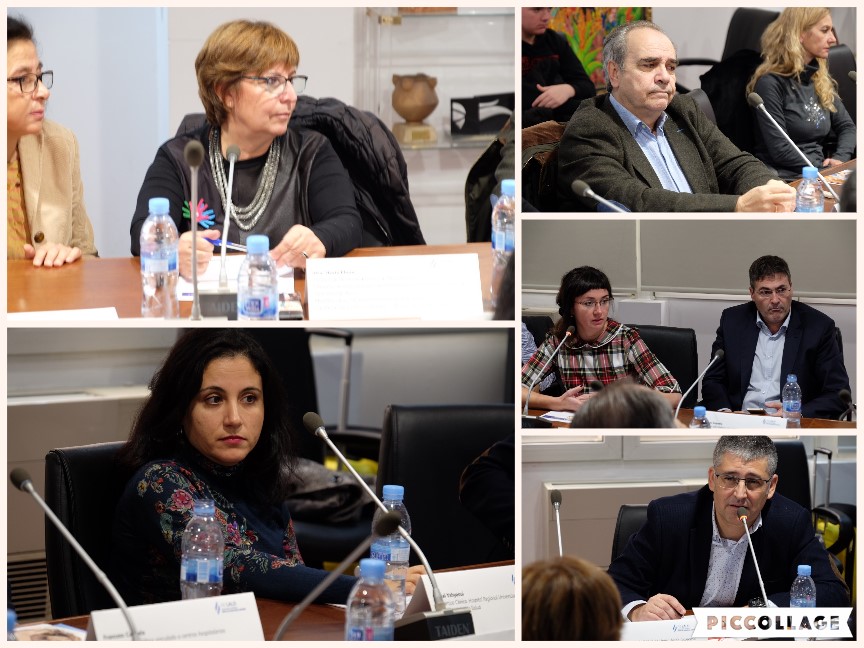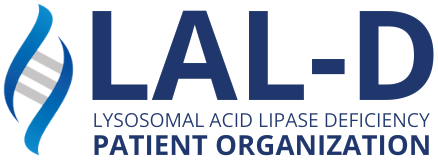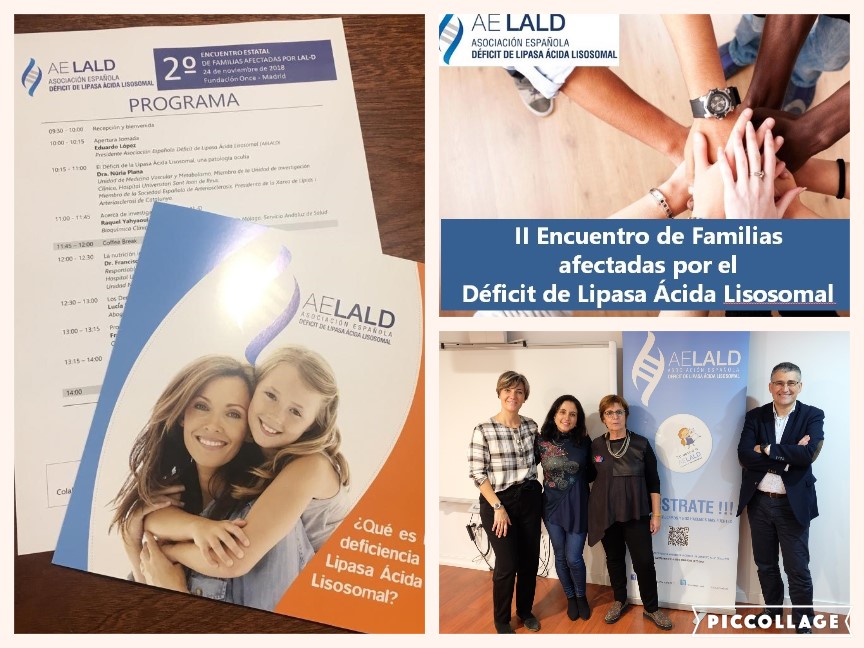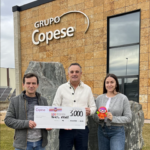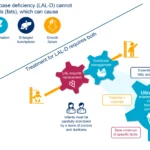This disease, considered ultra-rare and affecting 37 people in Spain, is also known as Wolman’s disease and Cholesterol Ester Storage Disease.
Lysosomal Acid Lipase Deficiency (LAL-D) is an autosomal recessive storage disease based on the accumulation of cholesterol esters and triglycerides in the cellular lysosome. This disease is characterized by multiorgan involvement, including the liver, spleen, cardiovascular system, and, to a certain extent, the gastrointestinal system. LAL-D can be differentiated into two phenotypes. One is Wolman’s disease, which affects infants and is fatal; death usually occurs within the first 12 months of life. Cholesterol Ester Storage Disease, the other phenotypic expression, manifests less rapidly and affects both children and young adults. Unfortunately, once symptoms develop, a significant percentage of patients may experience progression from liver fibrosis to cirrhosis or the need for a liver transplant within 3 years of symptom onset.
The frequency of the disease is still not fully known. Studies have reported various prevalence estimates, ranging from 1 in 130,000 to 1 in 300,000.
The Spanish Association for Lysosomal Acid Lipase Deficiency (AELALD) was founded in January 2015 by the parents of a 3-year-old girl diagnosed with this disease. The association’s purpose is to care for, unite, and provide guidance to affected individuals and their families, to promote widespread awareness in the diagnosis of new patients, and to promote research into the disease.
Being the only specific Association for this disease in Europe, the II Meeting of Affected Families was held last Saturday, November 24, 2018 in Madrid (at the ONCE Foundation), with the participation of specialists in the disease such as Dr. Nuria Plana (Vascular Medicine and Metabolism Unit. Member of the Clinical Research Unit, Sant Joan de Reus University Hospital. Member of the Spanish Society of Arteriosclerosis. President of the Xarxa de Lípids i Arteriosclerosi de Catalunya) who detailed to the audience the consequences of the disease and its treatment to avoid a fatal evolution of it; the researcher Raquel Yahyaoi (Clinical Biochemistry. Regional University Hospital of Malaga. Andalusian Health Service), who explained the latest advances in research regarding LALD, as well as Dr. Francisco Arrieta (Head of the Congenital Metabolic Diseases Unit in Adults, Ramón y Cajal University Hospital · Department of Endocrinology and Nutrition. Clinical Nutrition and Dietetics Unit) who advised patients and their families on the most appropriate diet and nutrition for this disease. Finally, Lucia Fernández (Lawyer specialized in Health Law. Legal Department at IFSA SALUD) also participated with their presentations, who spoke about Patients’ Rights, and Francesc Cayuela (IT consultant linked to hospitals) who explained the iXarop Project (research saves lives).
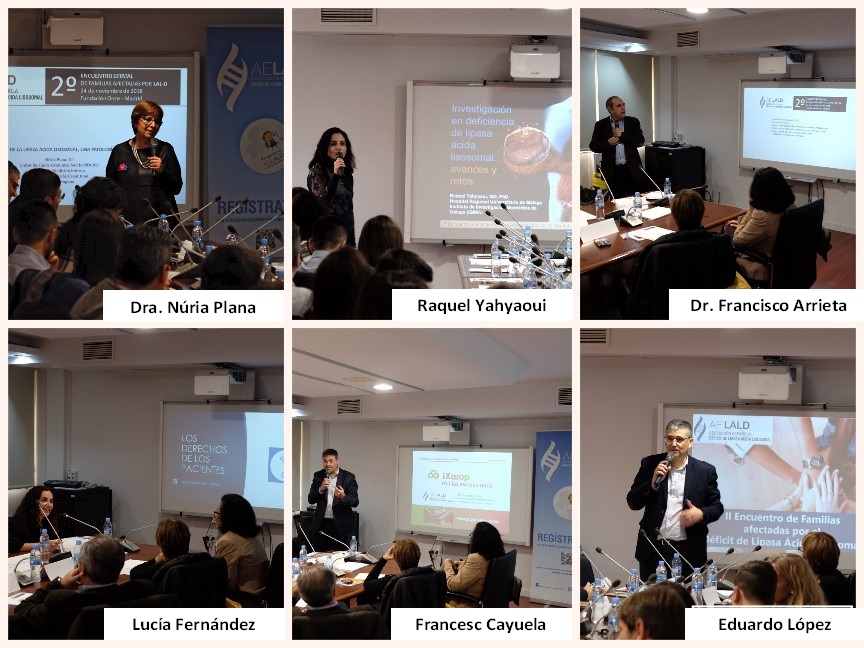
All of them shared their knowledge of this disease, which helped families and their patients gain greater understanding and align their efforts to motivate themselves as a group to increase awareness, increase access to treatments, and motivate researchers to care about this disease.
The only medication available for ALL-D, Kanuma, is based on enzyme replacement therapy, providing what patients lack. It was approved by the European Medicines Agency (EMA) in September 2015. This treatment does not cure patients, but it improves their condition and prevents fatal progression of the disease. At this time, it is the only hope for patients and their families.
For Eduardo López, President of AELALD, the importance of this congress lay in having the possibility of putting all the affected patients and their families in contact with each other with the objective of creating a compact and coordinated pressure group in order to achieve a greater dissemination of knowledge about this serious disease, to support free access to treatment for all those affected and, of course, to try to obtain sufficient financial support to initiate lines of research that will allow the cure of the disease in the coming years.
